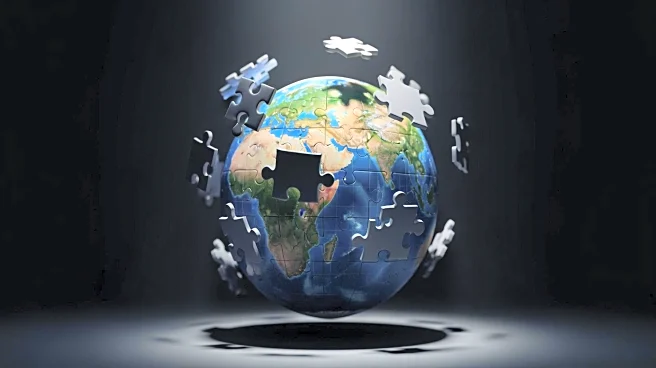What's Happening?
The International Maritime Organization (IMO) has decided to postpone discussions on the Net-Zero Framework for one year. This framework was intended to establish a global standard for decarbonizing the shipping
industry and introduce a global carbon pricing mechanism. The decision to adjourn was made after a contentious week of discussions, with 57 countries voting in favor of the delay and 49 against. The United States, Russia, and several other countries opposed the framework, while China, the European Union, and the United Kingdom supported it. The postponement has been met with criticism from environmental groups and parts of the shipping industry, who argue that the delay represents a missed opportunity to address climate change.
Why It's Important?
The postponement of the Net-Zero Framework is significant as it delays the implementation of a global approach to reducing carbon emissions in the shipping industry, which is a major contributor to global greenhouse gas emissions. The decision reflects geopolitical tensions and differing national interests, with some countries fearing economic repercussions. The delay could lead to a fragmented regulatory environment, as individual nations or regions may implement their own measures, potentially disrupting international shipping operations. The decision also highlights the challenges of achieving consensus on global environmental policies, which are crucial for addressing climate change.
What's Next?
The IMO will continue to work on building consensus over the next year, with the aim of revisiting the Net-Zero Framework in 2026. In the meantime, amendments to existing regulations, such as MARPOL, will proceed. Stakeholders in the shipping industry and environmental groups are likely to increase their advocacy efforts to ensure that a robust framework is eventually adopted. The focus will also shift to the IMO’s Marine Environmental Protection Committee and its upcoming session in April 2026, where further discussions on energy efficiency and decarbonization are expected.
Beyond the Headlines
The decision to delay the Net-Zero Framework highlights the complex interplay between environmental goals and economic interests. It underscores the need for international cooperation in addressing climate change, as unilateral actions by individual countries may not be sufficient. The postponement also raises ethical questions about the responsibility of developed nations to lead in climate action, given their historical contributions to greenhouse gas emissions. The outcome of this decision could influence future international negotiations on climate policy, setting a precedent for how global environmental challenges are addressed.









